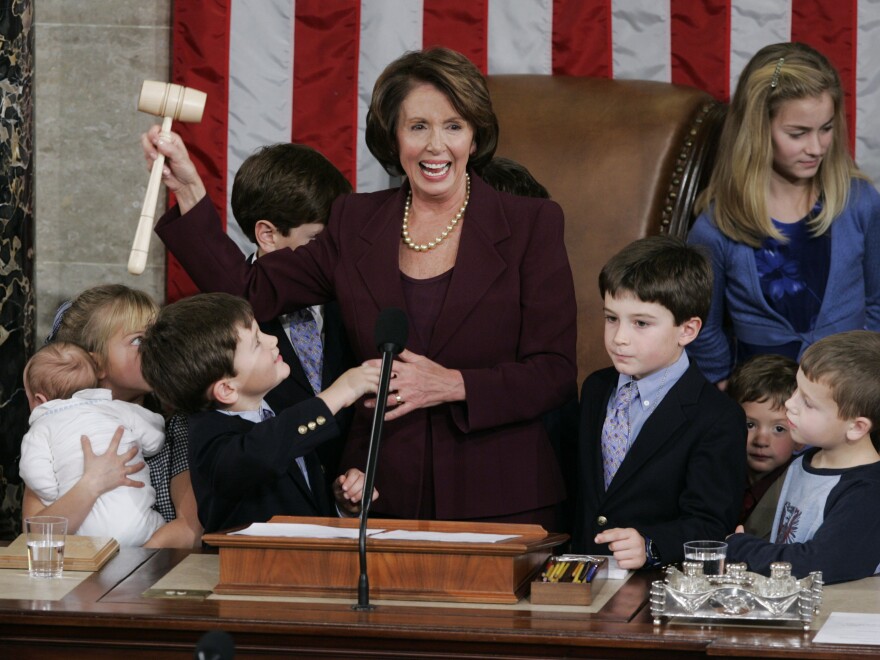Updated November 17, 2022 at 5:34 PM ET
Speaker Nancy Pelosi — who shattered the "marble ceiling" to become the first woman to lead the U.S. House — announced Thursday she will step down from party leadership.
"With great confidence in our caucus, I will not seek reelection to Democratic leadership in the next Congress. For me the hour has come for a new generation to lead the Democratic caucus that I so deeply respect," Pelosi said in a speech on the House floor. "I'm grateful that so many are ready and willing to shoulder this awesome responsibility."
Pelosi said she will continue to represent her San Francisco district in the House.
In her remarks, Pelosi warned that democracy is "majestic, but it is fragile" and said voters in 2022 sent a message to Congress that they would not support those who supported violence or insurrection. She also applauded the chamber for becoming more diverse over the course of her 35-year career. When she first entered Congress in 1987 there were 12 women in the Democratic caucus and now there are 90. "And we want more," she said, to applause.
Her decision comes a day after Republicans officially won control of the chamber in the 2022 midterms, and three weeks after the violent assault on her husband, Paul, at their San Francisco home.
The GOP is expected to have a razor-thin majority after the "red wave" never materialized on Election Day. Democrats defied historical expectations and performed better in governor, Senate and House elections than anticipated.
Her decision comes as no surprise on Capitol Hill, and is consistent with a promise she made four years ago to self term limit after Democrats won the majority in 2018 and she became the first speaker since the legendary Sam Rayburn to claim the speakership twice. There has been a quiet desire among rank and file Democrats to elect a younger slate of leaders to replace Pelosi, who is 82, and the two other top House Democratic leaders, Rep Steny Hoyer, D-Md., and Rep. Jim Clyburn, D-S.C., who are also in their 80s.
Following Pelosi's announcement, Hoyer, who is currently the House Majority Leader, said he will not run for a leadership position in the next Congress.
"Now is the time for a new generation of leaders," Hoyer said in a statement, adding that he would support Democratic Rep. Hakeem Jefferies.
House Democrats will hold leadership elections at the end of the month, and Pelosi's announcement is likely to set off a flurry of leadership bid announcements.
At the top of the list is Jeffries of New York, Katherine Clark of Massachusetts and Pete Aguilar of California. All three serve in lower-tier leadership roles now and are interested in moving up the ladder. Jeffries, who is 52, Clark, who is 59, and Aguilar, who is 43, would make an African American, a white woman and a Hispanic the new faces of the party. Reps. Ami Bera and Tony Cárdenas, both of California, have already announced campaigns to run the Democratic Congressional Campaign Committee, the Democrats' campaign arm, for the 2024 election.
Pelosi will be a tough act to follow
Even those who previously clashed with Pelosi praise her record of steering her often divided caucus through difficult times, with little room for error. With only a five-seat majority the speaker helped muscle through President Biden's legislative accomplishments — a pandemic aid bill, a bipartisan infrastructure bill, legislation boosting production of semiconductor chips and a measure lowering prescription drug costs and investing in climate programs.
"I've been elected for 26 years. I've been doing this for a while. I believe that she has been the most effective speaker and leader that the House of Representatives ever had," Cárdenas said after Pelosi's speech. "To me every moment has been a blessing, and an honor to serve with her."
Rep. Debbie Dingell called Pelosi "one of the giants of American history," and said she "opened the doors wider for every one of us women."
She also commended Pelosi's toughness as a political negotiator.
"[She] knew when to lower the hammer," Dingell said. "Thankfully I didn't have the hammer lowered on my head often."
Biden and Pelosi spoke Thursday morning, according to the White House, and the president congratulated her on her historic tenure, one that he noted was made over four terms: "I know because I've seen her in action during my career as Senator, Vice President, and now as President," Biden said in a statement following her announcement.
"Because of Nancy Pelosi, the lives of millions and millions of Americans are better, even in districts represented by Republicans who voted against her bills and too often vilify her," the statement reads. "That's Nancy — always working for the dignity of all of the people."

When she took the gavel for the first time in the House chamber in 2007, she surrounded herself with children — including some of her own grandchildren — on the floor. Throughout her tenure, she has repeatedly said her focus is to enact progressive policies on health care, child care and climate change, all guided by the mantra "for the children." She continued to serve as the minority leader when Republicans took control of the House in 2010 and made history in 2019 when she was elected speaker again. Drew Hammill, Pelosi's longtime spokesperson, regularly answered questions about her future in recent years, saying the speaker "is not on a shift, but on a mission."
Lexie Schapitl contributed to this story.
Copyright 2022 NPR. To see more, visit https://www.npr.org.





